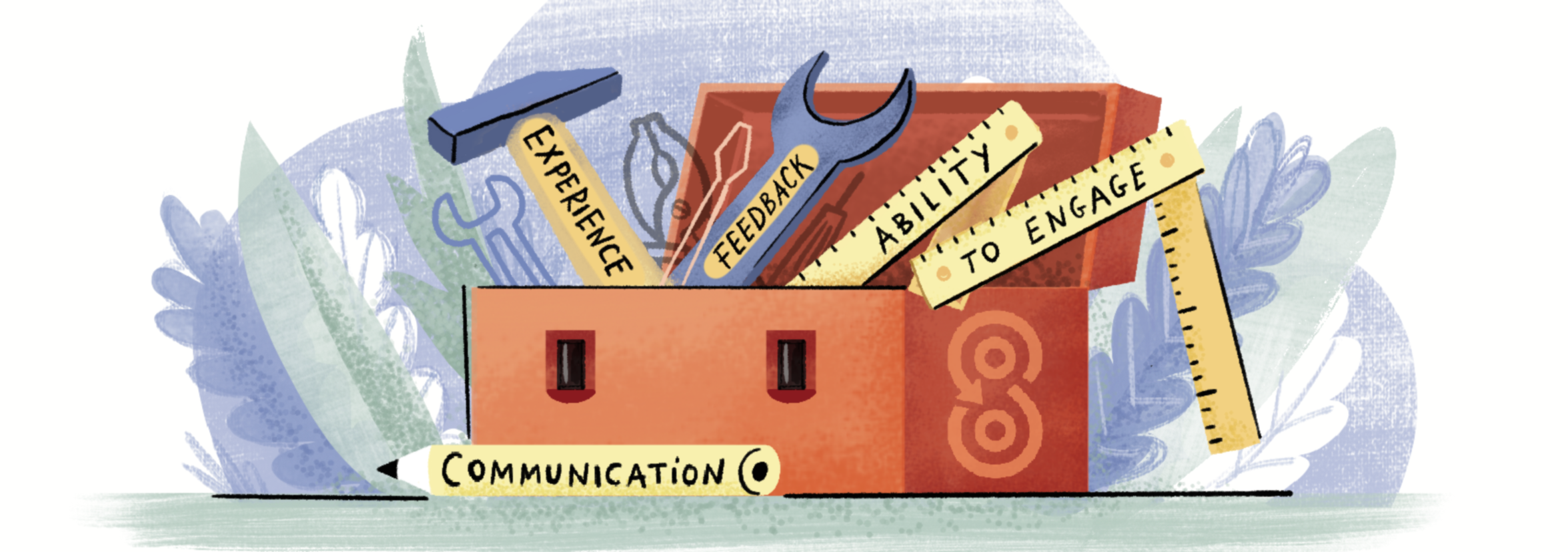The Mentor’s Toolbox: Essential Skills for a Mentoring Career

As a mentor, you’ll often find yourself wondering about the essential mentoring skills required to fuel your career path. After all, every mentee will learn and develop along their path at their speed while you guide them using the knowledge and experience you’ve developed throughout your career.
That being said, while teaching is its own skill set, it’s one that anyone can develop with time. Today, we’ll explore how your professional background can provide you with skills for mentoring as well as some simple tips and tricks to help you along the way.
Four Essential Mentoring Skills
Experience
In many ways, you can view the experience as not just a tick-box but one of the most essential mentoring skills. While the other skills we’ll talk about are all valuable, they all extend from that base of experience – from the knowledge you’ve acquired through your day-to-day work.
No matter the industry, no matter the role, experience is everything. Experience can be job-specific – understanding and tackling challenges that are unique to the role you’ve held – but it can also be general.
Did your experience teach you to solve problems independently as and when they arose? Did it teach you vital interpersonal skills such as leadership and teamwork? If so, then that experience will be invaluable as a mentor.
It is no wonder experience is considered the backbone of your mentoring skills and competencies. And that’s not even mentioning the amazing value your network will bring to the table. Using your experience, you’ll be able to help your,entee meet the people who’ll make their career dreams a reality.
Always remember that it’s your experience that makes you the excellent mentor you are!
Communication
If there’s one skill that’s required across every field, it’s the ability to communicate effectively.
Communication skills for coaching and mentoring can come in many different forms. In an office environment, you may have been required to take notes or to write clear and concise emails. In a factory, you might have had to communicate crucial safety information to new employees in a way that left no room for misunderstanding.
We often get asked, what skills does mentoring give you, especially when you’re just starting? Allow us to explain. When you communicate, it’s important to play both to your strengths and those of your mentee. Find the methods that work for both of you.
Are you someone who likes to write extensive documents, outlining your aims and goals? If so then that’s excellent but will that help your mentee? If your mentee is more of a verbal communicator then you may feel that the two of you aren’t suited for one another, but not to worry.
Not only is this an excellent ‘teachable moment’ for your mentee to grow more familiar with written notes, but it’s also a chance for the two of you to find a hybrid method you can share.
Why not keep your notes in front of you while on voice call? That way you have a reference to keep you on track, while your mentee can communicate in the way that works best for them.
Of course, this is just one scenario but the key here is to always remember that this is a cooperative endeavour to take your mentee to the next step of their career journey. This give-and-take experience helps you build essential mentoring skills and competencies that are equally important for your career growth.
Feedback
When it comes to essential mentoring skills, giving and receiving feedback effectively is another universal skill that’s required across all job roles.
When giving feedback to your mentee, remember to put yourself in their shoes. How did it feel when you were new to your role? What did you struggle with and how did your superiors communicate that to you?
If you want to make sure you’re providing good, constructive criticism, then it’s also important to understand your mentee on a more personal level. Get to know one another so you can find their natural strengths and weaknesses. Also, remember to keep things gradual and that improvements can only come one at a time.
The best way to keep your feedback on track is to always balance the negative with the positive. To improve, people need to feel motivated and there’s no better motivator than a sense of progress.
Ability to Engage
People learn best when they’re engaged and they’re most engaged when they’re entertained. Who better to make your role entertaining than you? In current times, the ability to engage is one of the most essential mentoring skills one needs to possess.
If you can bring all your passion to bear then you won’t struggle to engage your mentee even for a moment. After all, there are few things more interesting than listening to knowledgeable people discuss the subject they’re passionate about.
Passing on your experience, information and contacts will certainly help your mentee to find their feet but if you can show them why you love what you do, then you stand to inspire them for years to come.
Our experiences shape us and the more time we spend working in a role the more we learn. Ultimately, the most essential skill for a mentor to have is the power to be themselves – to be the person who’s stood in their shoes and walked their path. If you can do that then you have the chance to make a life-changing difference for your mentee! Sign up today and start getting paid for giving back!


